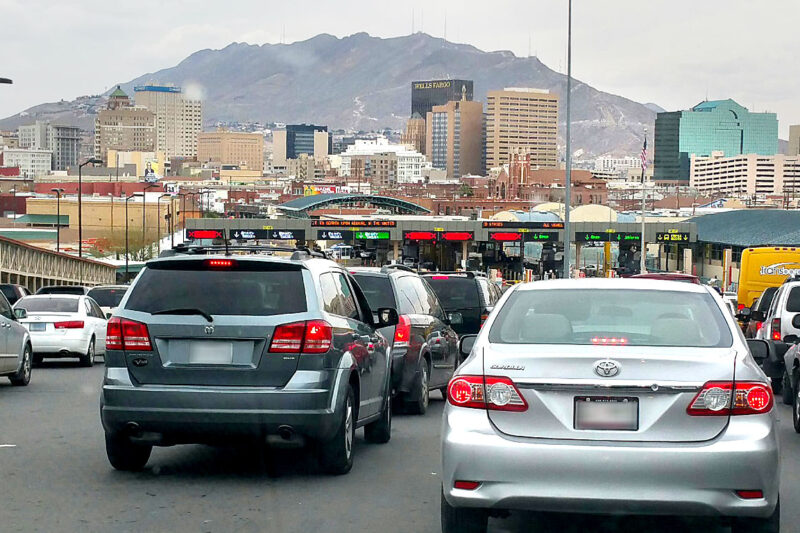The Misconduct Continues: Border Officer Verbally Abuses 51-Year-Old Grandmother By Calling Her a ‘Whore’


A version of this blog originally ran at the ACLU of New Mexico.
“You’re a whore.”
That’s what a U.S. Customs and Border Protection officer told 51-year-old grandmother Amanda Rodríguez, as she passed through the Ysleta port of entry in El Paso, Texas, for her weekly shopping trip to Wal-Mart.
Her ordeal began last September when the officer conducted a routine inspection as she crossed from Ciudad Juárez to El Paso to run errands. At the port of entry, the agent made sexist comments about her looks and asked her leading questions about whether she was entering the U.S. to perform “favors.” Rodríguez, who was confused by the line of questioning, didn’t understand well enough to contradict the agent’s allegations that she was a sex worker.
“Andas de puta,” the CBP officer aggressively told her, without any evidence to back up his claim: “You are a whore.”
Mrs. Rodríguez is not, nor has she ever been a sex worker. With her husband of 33 years, Mrs. Rodríguez is a proud mother of two who, when not doting on her grandchild at home, works part-time for a community group that helps support women in Ciudad Juárez seeking to escape domestic violence. But none of this mattered when things came to a head the following month.
As any woman knows, it’s scary to face unwanted advances from men in public. It is doubly frightening when unwanted advances come from an armed man who claims extraordinary power to pull you out of your car, detain you, and order you to be strip searched.
When Mrs. Rodríguez tried to cross into El Paso again in October to get her shopping done, CBP immediately pulled her aside and detained her for 10 hours. They falsely accused her of prostitution, threatened her with jail time, mocked her women’s rights work in Ciudad Juárez, and coerced her into signing a document containing a falsified interrogation in English that she didn’t understand. They then told her that they had revoked her visa and that she would be barred from entering the United States for a period of five years.
Mrs. Rodríguez’ story is one of 13 cases the ACLU of New Mexico Regional Center for Border Rights has urged the Department of Homeland Security Office of Inspector General and CBP Office of Professional Responsibility to investigate yesterday.
The complaint details CBP officers at ports of entry in El Paso, Texas, and southern New Mexico engaging in widespread abuses, such as forcefully yanking a defenseless boy out of a vehicle; calling a noncitizen a “wetback” and denying access to her diabetes medication; subjecting multiple men and women, two of them in their 50s, to humiliating strip searches without consent; and coercing individuals to accept swift deportations with long-term consequences that bypass the judicial process. In multiple cases, border residents reported that CBP officers discouraged them from complaining or failed to inform them how to file a complaint.
As a border resident, I myself have experienced misogynistic and unprofessional treatment at a port of entry. Last year, while I was waiting at the Bridge of the Americas in El Paso, a CBP officer tapped on my car window to pry into my relationship status and ask for my phone number. I politely declined, but then agonized as he continued to follow my car and peer inside. As any woman knows, it’s scary to face unwanted advances from men in public. It is doubly frightening when unwanted advances come from an armed man who claims extraordinary power to pull you out of your car, detain you, and order you to be strip searched.
Every day, more than 600,000 people nationwide lawfully enter the United States through land ports of entry to vacation, visit family, or shop. Cross-border commerce with Mexico, our top trade partner, fuels state economies and creates one in 24 jobs nationwide. Rather than celebrate border communities’ economic contributions and unprecedented public safety, irresponsible rhetoric has led to a dramatic buildup of CBP enforcement without commensurate investment in oversight and accountability.
Scandalously, CBP officers who conduct themselves unprofessionally or otherwise abuse people are unlikely to face any sort of discipline. Peer law enforcement professionals, including a former top official at CBP, didn’t mince words when they recently concluded, “The CBP discipline system is broken.” Indeed, a May 2012 complaint filed by ACLU affiliates and detailing similar abuses at ports of entry border along the border went largely uninvestigated, fitting a pattern identified in a study based on hundreds of complaints that found 97 percent resulted in no action taken.
CBP’s newly minted Office of Professional Responsibility has a real test before it to uproot a culture of impunity that has firmly taken hold in our nation’s largest police force. Failure to transparently and promptly investigate allegations undermines public confidence that CBP takes abuse seriously and does a disservice to officers who act professionally.
Ultimately, reforming CBP culture will require changing officers’ beliefs and potential biases, including those related to gender. When CBP officers dismiss women’s rights or act as if a badge empowers them to make unwanted advances, they offend our most basic understandings of equity.
The ACLU stands with Amanda Rodríguez, and we will not allow CBP to strip any border resident of their dignity or due process. The clock is ticking on whether CBP will act on these serious complaints and begin to heal its broken trust in border communities.




